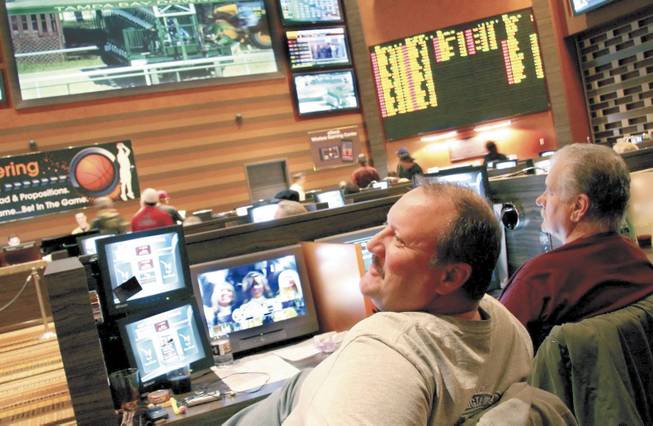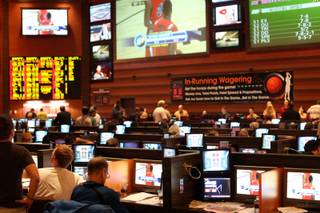
Bettor Stacy Hofferber of Las Vegas relaxes in the sports book at M Resort with the touch-screens offering betting during live basketball games at left in cubicle.
Wednesday, Aug. 11, 2010 | 2 a.m.
Sun Coverage
Sun archives
- Tropicana announces deal to offer mobile gaming (6-10-2010)
- Technology is king at the M Resort sports book (3-20-2010)
- Hard Rock Hotel to offer Cantor Gaming mobile gaming devices (2-19-2010)
- A new way of wagering (7-21-2008)
Cantor Gaming, which operates the race and sports books at M Resort, the Venetian and Palazzo, offered an interesting statistic recently: The company says the three books are responsible for about 15 percent of the state’s annual sports wagering handle, based on figures from the Gaming Control Board.
That’s just three sports books out of 208 statewide. Do the math and it reflects that Cantor has a handle of about $375 million a year based on a statewide handle of $2.5 billion.
The reason Cantor is doing so much better than its counterparts appears to be its emphasis on technology and new offerings associated with its gadgets, although rivals say it may have more to do with M Resort just accepting higher numbers of large wagers.
The company’s eDeck devices at M — they’re called “pocketcasino” at the Venetian and Palazzo — are about the size of a PDA and can be used to play blackjack and other casino games from the sports book and other public areas in the casino. The eDeck and recently introduced tablet-size mobile devices can be used for in-running sports wagering.
Unlike traditional sports wagers, in-running enables players to bet on outcomes while a game is being played. Some view it as a whole new ballgame for casinos, even though the practice has been around for a while.
Cantor developed a wagering platform for games as they’re played and began using it in Europe a decade ago. Other companies have tried less sophisticated as-the-game-is-played wagering, such as bets on whether a football play would go left, right or up the middle.
Here’s how M’s system works: A player sets up and puts money into a password-protected wagering account. The player then logs on through a casino-issued mobile device or a hard-wired station in the sports book.
A player has to have an account to be issued a mobile device. Bettors who want to use mobile devices request them at the sports book ticket window and can use them for as long as they like that day, and they have to turn them in by the time the book closes.
As a team scores, the odds change and a gambler can take advantage of the new offering to bet more on a team or hedge a bet he’s unsure of.
For example, the Dallas Cowboys have been made a 3 1/2-point favorite when they play the Washington Redskins in Washington in the National Football League’s opening week Sept. 12. If Dallas takes the opening drive down the field for a touchdown, the odds will change — maybe the Cowboys will become a 7 1/2-point favorite to win at that point.
Besides line changes, gamblers can bet on events in the game, such as whether a team would get a first down in the current series, whether the next play will gain more than 20 yards or whether a field goal will be good.
Several variables are built into the odds-setting program, including players’ game performances. Each key player is assigned a value, and it becomes part of an algorithm in the program. For example, if a key player is injured and removed from a game, the backup generally isn’t as good, which can affect the game’s outcome.
The concept was developed by Cantor Fitzgerald, a financial services company involved in $140 trillion in market transactions a year.
“The Cantor philosophy has been to introduce new cutting-edge ideas to be able to expand volumes of business,” said Lee Amaitis, president and CEO of Cantor Gaming.
In September 1998, Cantor Fitzgerald introduced eSpeed, the first electronic trading platform for U.S. Treasuries. Recognizing the possibilities for casino play, Cantor went to work on a gaming application and formed Cantor Gaming in Great Britain in 2000.
The company was dealt a huge setback months later when many executives died on Sept. 11, 2001, at their offices in the World Trade Center in New York. Amaitis kept the company working on mobile gaming applications, and in 2005 received a gaming license and helped get legislation passed in Nevada legalizing mobile gaming.
Cantor field-tested the mobile platform at the Venetian in 2008 and began acquiring companies that had the intellectual property it needed to develop the in-running product. When M Resort opened in March 2009, in-running was ready to go and the race and sports book was the first to offer it. Cantor hard-wired the system into 108 stations at M.
In September, in-running was introduced at the Venetian and Palazzo books.
The company’s strategy is to partner with a property rather than sell a system to an existing operator. Because many properties are under contract with sports-book operators or run their own books, expansion will take time.
Amaitis said new technology next will be rolled out at the Tropicana and Hard Rock Hotel. He thinks it’s only a matter of time before a sports book operator in Reno picks it up.
Traditionally, the way to make sports bets in casinos is to place a wager with a ticket writer at the counter.
Mike Colbert, the race and sports director at M, estimates that 70 percent of its increase in business is from traditional sports bettors who signed up for accounts.
“You don’t have to make people stand in line and you never even have to use cash when you bet,” Colbert said. “We’ve had people come in and deposit six figures into their account and then we don’t see them at the window.”
Book operators are learning more about their customers as the technology takes hold. Colbert said sharp players caught on quickly, so the audience wasn’t just Gen-X players comfortable with the devices. Eventually, many of the traditionalists began taking advantage of account betting and mobile devices. Some, he admitted, still prefer more traditional betting on games.
At M Resort, players can place in-running wagers in football, basketball, baseball, hockey, golf, tennis and soccer. But in-running isn’t available for every game. Colbert and his team select a game or two that they expect to have big followings for in-running wagers.
Last football season, Colbert said M’s sports book offered in-running wagering on three NFL games a day — the best 10 a.m. game, the best 1 p.m. game and the Sunday-night offering.
A version of this story will appear in the Friday issue of In Business Las Vegas, a sister publication of the Sun.


Join the Discussion:
Check this out for a full explanation of our conversion to the LiveFyre commenting system and instructions on how to sign up for an account.
Full comments policy